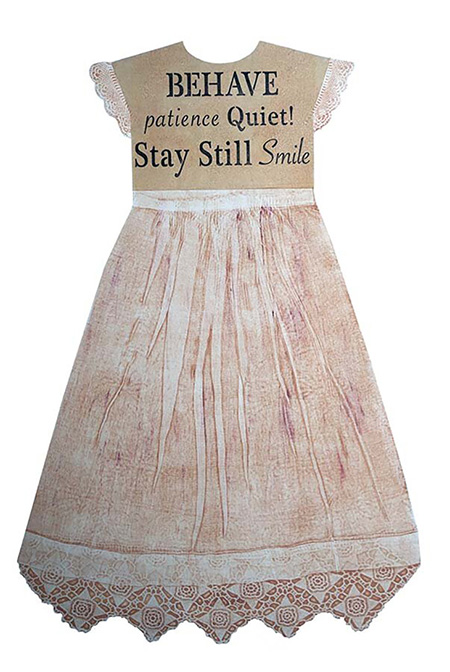
Continuing through October 30, 2021
Anna Mavromatis brings a range of influences and techniques to her latest exhibition, including feminist politics, her Greek heritage, and her schooling in fashion and printmaking. The show is dazzling, with eight suspended three-dimensional dresses constructed from folded and printed paper and seven flat dresses made with monotypes embellished with collage. There are wedding dresses bearing political statements and young girls’ frocks that address how girls are brought up to become submissive.
“Always as Told” is a monotype of a girl’s dress with “I will do as told ALWAYS” written across the bodice. The skirt and sleeves are a delicate lace pattern created using family heirloom linens as “plates,” a practice that Mavromatis uses to reconnect with her past. “Yes, No, Yes, No…” is a dress constructed from folded paper and coffee filters hand-stamped with those words, which express the ambivalence associated with the onset of puberty. On one hand, girls are expected to be pure and virginal for future husbands, but on the other hand, their bodies are changing, and their sexuality is being awakened. “Perpetual Blooming Spring” is a baby girl’s dress with a bodice of delicate hand-formed blossoms and a skirt of recycled coffee filters that perfectly captures the innocence and purity of youth. Another dress titled “What are little girls made of…,” answers the question with the phrase “…ribbons and laces, and sweet pretty faces, and such are young women made of” printed multiple times across the skirt. These fragile, feminine garments are purposefully lovely, in direct contrast to the marketing of young women as objects of desire, not to be touched until they marry.
Mavromatis’s wedding dresses do not portray marriage as a state of living happily ever after, but exactly the opposite. “Rules of Engagement” is made with coffee filters, origami, and handmade folded flora on which is printed such troubling words as torture, denial, cruelty, scream, heartbreak, withdrawal, and obliteration. “Ever After?,” the largest dress in the show, greets us as we enter the gallery, its interrogative title a preview of what is to follow.
Another series in the show addresses women's issues. In “Daybreak,” cyanotypes printed on coffee filters present images of early 20th-century suffragettes who worked to achieve the vote for women, fighting for equality and human rights. As Mavromatis writes on her website, “By not accepting centuries-old, predetermined lives of obedience and servitude, they planted the seeds for a new society, where girls plan and create their own chosen future.” She borrowed images from the Library of Congress and printed them on paper to form the dress’s skirt, while the bodice is created from old dictionary pages that have been folded and stitched to reveal more photographs layered beneath them. The same technique is used for “Hidden Figures,” a large wall piece for which the artist cut 576 squares from a dictionary, then dyed, folded, and stitched them together. Tucked inside each square are portraits of women, including scientists, authors and artists. These portraits range from Ruth Bader Ginsburg to Dorothea Lang’s migrant mother to an ancient Greek kore figure.
Printmaking, photography, manipulated textiles and fashion design are combined in Mayromatis’ creative process. She transforms recycled materials into meaningful cultural artifacts. Her use of coffee filters references her association of the smell of coffee with family secrets being discussed by adults that she overheard as a child. She is striving to come to terms with leaving her homeland and childhood, as she left Greece to study architecture in Italy and then went to London to study fashion before emigrating to the U.S. A sense of loss and separation permeates her work, bringing to it a feeling of melancholy. These haunting dresses convey the artist’s beliefs and wide range of experiences. There is history and tradition, ritual and remembrance in Mavromatis’s work, all of which lend it a powerful presence.
